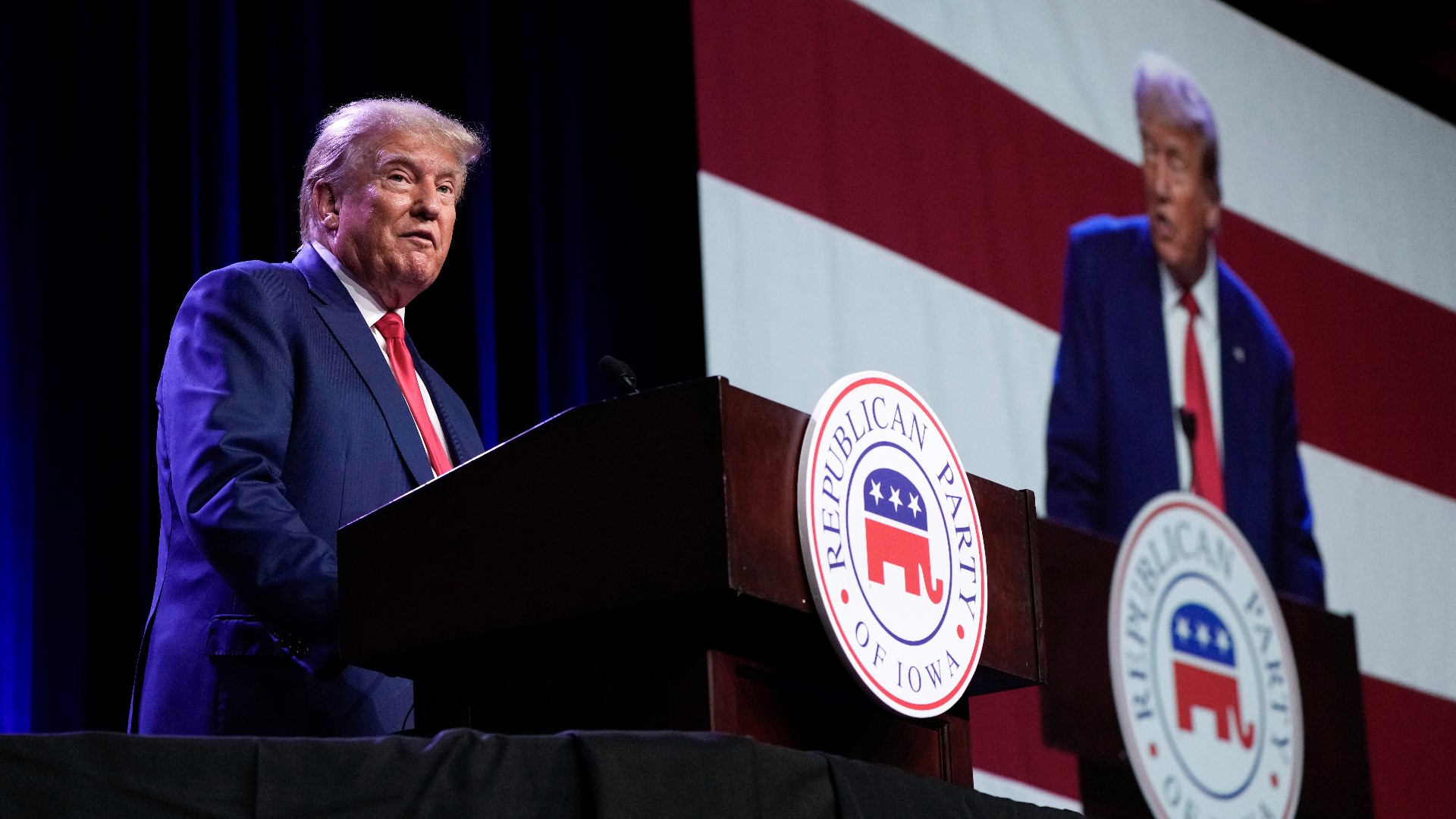DES MOINES, Iowa — Former President Donald Trump has been indicted on criminal charges for the third time, and this indictment comes amid a very active political environment in Iowa.
The charges confirmed Trump's efforts to overturn the 2020 election results, which led up to the January 6 Capitol riots.
Trump is already polling ahead in Iowa, but with Iowa Caucuses on the horizon, some are questioning how this indictment could impact his chance at reelection.
How will Trump's indictment affect his 2024 campaign?
Since there is no ballot in Iowa, Iowan voters are able to show their support at the caucuses for anyone they want.
"So, as long as Trump remains a declared candidate, he's very likely to get significant support in the Iowa Caucus. And even if he withdrew, people could still voice their preference for him as the presidential candidate, even if he is not a declared candidate," said Karen Kedrowski, a professor of political science at Iowa State University.
This method leaves opportunities for voters to decide who they want to support, even after the indictment.
"What I think is going to happen now is the conversation is going to change to: What is the indictment going to do to the electability of trump?" Board Member for the League of Women Voters of Iowa Linda Hagedorn told Local 5.
This indictment will now require Trump to devote time and preparations to trials and judicial proceedings, which experts say could take away from his campaign.
"The question is: Will people be willing to keep donating ... and as the legal bills mount, what will be left for the campaign to spend on advertising or surrogates traveling to places like Iowa to campaign?" Kedrowski said.
Due to this type of unprecedented indictment, experts said this could be the reason for lack of comment from Iowa lawmakers.
"This is just a somewhat different kind of indictment, right. It really has to do with the powers of government and trying to overthrow an election. Which as serious as the other indictments are, they are not in the same, you know, ilk," Kedrowski said.
The overall outcome of Trumps support in Iowa could still change, but as of now, experts believe the indictment hasn't yet impacted the overall support of Trump from Iowans.
RELATED: Yes, you can be elected president if you've been indicted or found guilty in a criminal case
Will Trump attend the first Republican National Committee debate?
His unwavering poll popularity is part of the reason why Trump hasn't committed to the first Republican National Committee's debate on Aug. 23 in Milwaukee.
The former president has said that since he's leading all other GOP candidates in national polls, he doesn't see a reason why he should take the stage with competitors.
The six other Republican presidential candidates who have qualified for the debate later this month include Florida Governor Ron DeSantis, South Carolina Senator Tim Scott, former South Carolina Governor Nikki Haley, former New Jersey Governor Chris Christie, entrepreneur Vivek Ramaswamy and North Dakota Governor Doug Burgum.
What are the criteria to participate in an RNC debate?
In order to qualify for this month's debate, candidates must meet the following requirements:
- Each must secure 40,000 donors, including 200 of those from 20 states and/or territories.
- Candidates also need support from 1% of republican voters in three different national polls, or in two national polls and two polls in early primary states
Former Vice President Mike Pence and former Arkansas Governor Asa Hutchinson have met the polling requirements, but have struggled so far to secure the necessary donors to debate.
The republicans who have failed to meet both polling number requirements and donors include: Conservative radio host Larry Elder, Miami Mayor Francis Suarez, entrepreneur Ryan Binkley and former Texas congressman Will Hurd – also have failed to meet the requirements.
Binkley's team sent Local 5 the following statement when we asked him for comment on failing to qualify so far.
"We are confident of an aggressive strategy we've implemented recently… getting donations in over 20 states," Binkley said. "We're making big leaps in our donor base every day, and we are showing up in the polls…"
Non-qualified candidates have until Aug. 21 to meet the polling and donor requirements to attend the debate 48 hours later.
But it won’t get any easier for these candidates, because for the second debate — scheduled at the end of September in California — White House hopefuls will have to secure 50,000 donors and 3% in two national polls.

